John Adams, like several others of the founding fathers of the United States of America, showed an interest in the Venetian state as a possible inspiration for who to make America.
John Adams published a three volume work named “A Defense of the Constitutions of Government of the United States of America” in 1787, where among many other arguments, he describes the Venetian constitution.
Below is the full text of the relevant letter.
John Adams: A Defense of the Constitutions of Government of the United States of America, Vol. I, letter 19.
THE republic of Venice has existed longer than those of Rome or Sparta, or any other that is known in history. It was at first democratical; and their magistrates, under the name of tribunes, were chosen by the people in a general assembly of them. A tribune was appointed annually, to distribute justice on each of those islands which this people inhabited. Whether this can be called collecting all authority into one center, or whether it was not rather dividing it into as many parcels as there were islands, this simple form of government sufficed, in so small a community, to maintain order for some time; but the tyrannical administration of the tribunes, and their eternal discords, rendered a revolution necessary; and after long altercations, and many projects, the people, having no adequate idea of the only natural balance of power among three orders, determined that one magistrate should be chosen, as the center of all authority — the eternal resource of every ignorant people, harrassed with democratical distractions or aristocratical encroachments. This magistrate must not be called king, but duke, and afterwards doge; he was to be for life, but at his death another was to be chosen; he was to have the nomination of all magistrates, and the power of peace and war. The unbounded popularity and great real merit of Paul Luc Anafeste, added to the pressure of tribunary tyranny, and the danger of a foreign enemy, accomplished this revolution. The new doge was to consult only such citizens as he should judge proper: this, instead of giving him a constitutional council, made him the master; he however sent polite messages to those he liked best, praying that they would come and advise him. These were soon called pregadi, as the doge’s council is still called, though they are now independent enough of him. The first and second doge governed mildly; but the third made the people repent of their confidence: after serving the state by his warlike abilities, he enslaved it; and the people, having no constitutional means to restrain him, put him to death in his palace, and resolved to abolish the office. Hating alike the name of tribune and of doge, they would have a master of the militia, and he should be annually eligible. Factions too violent for this transient authority arose; and, only five years after, the people abolished this office, and restored the power of the doge, in the person of the son of him whom in their fury they had assassinated. For a long course of years after this, the Venetian history discloses scenes of tyranny, revolt, cruelty, and assassination, which excite horror. Doges, endeavouring to make their power hereditary, associating their eldest sons with them in office, and both together oppressing the people; these rising, and murdering them, or driving them into banishrnent, never once thinking of introducing a third order, between them and their first magistrate, nor any other form of government by which his power or theirs might be limited. In the tenth century, a son of their doge took arms against his father, but was defeated, banished, and declared incapable of ever being doge; yet no sooner was the father dead, than this worthless son was elected, and brought back in great pomp to Venice: he became soon a tyrant and a monster, and the people tore him to pieces, but took no measure to frame a legal government. The city increased in commerce, and by conquests, and the new subjects were not admitted to the privileges of citizens: this accession of dominion augmented the influence of the doge. There was no assembly but that of the people, and another called the council of forty, for the administration of justice. This body, in the twelfth century, formed something like a plan of government.
Although the descendants of the ancient tribunes and doges were generally rich, and had a spontaneous respect shewn to the antiquity of their families, they were not properly a nobility, having no legal rights, titles, or jurisdictions. As any citizen might be elected to a public office, and had a vote in the assemblies, it was necessary for the proudest among them to cultivate the good will of the multitude, who made and murdered doges. Through all these contests and dissensions among a multitude, always impatient, often capricious, demanding, at the same time, all the promptitude and secrecy of an absolute monarchy, with all the licence of a simple democracy, two things wholly contradictory to each other, the people had, to their honour, still maintained their right of voting in assembly, which was a great privilege, and nobody had yet dared to aim a blow at this acknowledged right of the people.
The council of forty now ventured to propose a plan like that of Mr. Hume in his idea of a perfect commonwealth, and like that which our friend, Dr. Price, informs us was proposed in the convention of Massachusetts.
The city was divided into six districts, called sestiers. The council of forty proposed, that each of these partitions should name two electors, amounting to twelve in all, who should have the power of choosing, from the whole city, four hundred and seventy, who should have the whole power of the general assembly, and be called the grand council.
The people were amused with fine promises of order and regularity, and consoled with assertions that their right of election still continued, and that those who should not be chosen one year, might be the next; and, not perceiving that this law would be fatal to their power, suffered that aristocracy to be thus founded, which subsists to this hour. The next proposal was, that a committee of eleven should be appointed, to name the doge. Though the design of reducing the people to nothing might have been easily seen in these manoeuvres, yet the people, wearied, irritated, and discouraged, by eternal discords, agreed to both.
The council of forty, having thus secured the people, turned their eyes to the doge, whose authority had often been perverted to the purposes of oppression, and, having no legal check, had never been restrained but by violence, and all the confusions which accompany it. They proposed that a privy council of six should be appointed for the doge, one from each division of the city, by the grand council themselves, and that no orders should be valid without their concurrence: this passed into a law, with unanimous applause. They then proposed a senate of sixty, who were to be elected out of the grand council, and to be called the pregadi: this too was approved. The grand council of four hundred and seventy, the senate of sixty, the six counsellors, and eleven electors, were accordingly all chosen, and the last were sworn to choose a doge, without partiality, favour, or affection: and the new-chosen doge, having taken care to distribute money among the multitude, was received with universal acclamations. In his reign was instituted, by permission of the pope, the curious ceremony of wedding the sea, by a ring cast into it, in signum veri et perpetui imperii. Under the next doge the avogadors were instituted, to see that the laws were fully executed.
In the thirteenth century, six new magistrates, called correctors, were created by the senate, to enquire into all abuses during the reign of a deceased doge, and report them to the senate; and it was enacted, that the fortune of the doge should indemnify the state for whatever damage it had suffered during his administration: and these correctors have been appointed, at the decease of every doge since that time. In the next reign, a new tribunal of forty was erected, for the trial of civil causes. In the thirteenth century, a new method of appointing the doge, by the famous ballot of Venice, a complicated mixture of choice and chance, was adopted.
Each of the grand counsellors, now augmented to forty-one to avoid the inconvenience of an equal division, draws a ball out of a box, containing thirty gilt, and the rest white; those who draw the gilt ones go into another room, where is a box with thirty balls, nine of which are gilt; draw again, and those who obtain the gilt balls are the first electors; who choose forty, comprehending themselves in that number; the forty, by repeating the whole process, are reduced to twelve second electors, the first of whom names three, and the rest two a piece: these twenty-five draw again from as many balls, nine of which are gilt; this reduces them to nine third electors, each of whom chooses five: which forty-five are reduced, by a repetition of the ballot, to eleven fourth electors, and they have the appointment of forty-one, who are the direct electors of the doge. The choice generally turns upon two or three candidates, whose names are put into another box, and drawn out: the first whose name is drawn retires, and proclamation is made for objections against him; if any are made, he comes in, and is heard in his defence: then the electors proceed to determine by ayes and noes; if there are twenty-five ayes, he is chosen, if not, another name is read, and the same decision repeated, until there are twenty five in the affirmative.
The grand council, ever anxious to limit the power of the doge, soon thought it improper that the public acts should be signed by chancellors appointed by him, and accordingly determined to appoint this officer themselves.
The senate then began to think it too great a respect to the people to have the new doge presented to them for their acclamations, and ordained that a syndic should congratulate him in the name of the people on his election. The populace, who had weekly surrendered their rights, were very angry at being deprived of this show, and proclaimed a doge of their own; but he was afraid of the contest, and retired, and the people having no man of weight to head them, gave up this point.
The new doge, who had much contempt for popular government, and some resentment for the slight opposition he had met with, procured a law to be passed, that all the members of the grand council should hold their places for life, and transmit them to their posterity, and that their elections by the people’s electors should cease. This establishment of an hereditary legislative nobility, no doubt shocked the citizens in general, but chiefly those of ancient families, who were not at that moment members of the grand council; to silence these, the most powerful of them were received into the grand council, and others were promised that they should be admitted at a future time. Commerce and wars soon turned the attention of the rest of the people from all thought about the loss of their privileges. Some few, however, some time after formed a plan, not to convene the people in a body, and new-model the constitution, but to assassinate the doge and council all together. The plot, which was carried on by the plebeians, was discovered, and the chiefs executed. Another originated amongst the nobles, some of them of the grand council, who being of very ancient families, could not bear to see so many citizens raised to a level with themselves, and others of the most distinguished of these, who were not of the grand council, and had not been received afterwards according to promise. This produced a skirmish in the city, but some of the conspiring nobles were killed, the rest routed, and many executed, but it was thought prudent to admit several of the most distinguished families. These two conspiracies produced a council of ten, upon which were afterwards engrafted the state inquisition.
Great care is taken in Venice, to balance one court against another, and render their powers mutual checks to each other. The college called the seigniory, was originally composed of the doge and six counsellors; to these were added six of the grand council chosen by the senate, and called the savii or sages; then five more for land affairs, and then five for sea affairs, in the room of whom, five young noblemen are now chosen every fix months, who attend, without a vote, for their education; to these were added the three chiefs of the criminal court, from a jealousy of the power of the college, which is both the cabinet council, and the representative of the state, giving audience and answers to ambassadors, to agents of towns, and generals of the army; receives all petitions, summons the senate, and arranges its business.
There is one instance of a doge’s concerting a conspiracy, to shake off the controul of the senate; but as it was an old man of fourscore, whose young wife, on whom he doted, was not treated with sufficient respect by the nobility, we need not wonder, that he had not sense enough to think of introducing a regular, well-balanced constitution, by a joint concurrence of the people, and the nobility: the whole plan was to massacre the grand council; and although he engaged in his design some of the highest officers, and a large party, the plot was discovered, the doge himself tried, condemned, and beheaded, as so infamous a piece of mad villainy justly deserved.
A punctual execution of the laws, is no doubt essential to the existence of this state, and there are striking instances of persons punishing their nearest relations, with the most unrelenting severity; without this, the doge on one hand, or the people on the other, would soon think of a union against the ruling nobility. The aristocracy is always sagacious, and knows the necessity of a rigorous impartiality, in order to preserve its power, and all the barriers we have described have been erected for this purpose: but all would be insufficient to restrain their passions, without the lions mouths and the state inquisitors; these were engrafted on the council of ten. This terrible tribunal, is sovereign in all crimes against the state; it consists of ten chosen yearly by the grand council; the six of the seigniory assist, and the doges preside when they please. Three chiefs, appointed monthly by lot, to open all letters, seize the accused, take examinations, and prosecute the prisoner; who is closely confined, allowed no council, and finally acquitted or condemned to death, in public or private, by the plurality of voices. This was the original tribunal, but it was not found sufficient, and the state inquisitors were erected in the beginning of the sixteenth century. This tribunal consists only of three persons, all taken from the council of ten, who have authority to decide, without appeal, on the life of every citizen, the doge himself not excepted. They employ what spies they please; if they are unanimous, they may order a prisoner to be strangled in gaol, or drowned in the canal, hanged in the night, or by day, as they please; if they are divided, the cause must go before the council of ten, but even here, if the guilt is doubtful, the rule is to execute the prisoner in the night. The three may command access to the house of every individual in the state, and have even keys to every apartment in the ducal palace, may enter his bed-chamber, break his cabinet, and search his papers. By this tribunal, have doge, nobility, and people, been kept in awe, and restrained from violating the laws, and to this is to be ascribed the long duration of this aristocracy.
Such are the happy effects of the spirit of families, when they are not bridled by an executive authority, in the hands of a first magistrate on one hand, and by an assembly of the people in person, or by adequate representation, on the other. Such are the blessings which, in course of ages, spring from a neglect in the beginning, to establish three orders, and a perfect balance between them. There can be, in the nature of things, no balance without three powers. The aristocracy is always more sagacious than an assembly of the people collectively, or by representation, and always proves an overmatch in policy, sooner or later. They are always more cunning too than a first magistrate, and always make of him a doge of Venice, a mere ceremony, unless he makes an alliance with the people to support him against them. What is the whole history of the wars of the barons but one demonstration of this truth! What are all the standing armies in Europe, but another. These were all given to kings by the people, to defend them against aristocracies. The people have been generally of Mr. Turgot’s mind, that balances, and different orders, were unnecessary, and, harassed to death with the domination of noble families, they have generally surrounded the thrones with troops to humble them. They have succeeded so far as generally to make the nobles dependent on the crown, but having given up the balance which they might have held in their own hands, they are still subject to as much aristocratical domination, as the crowns think proper to permit. In Venice, the aristocratical passion for curbing the prince and the people, has been carried to its utmost length. It is astonishing to many, that any man will accept the office of doge. These sagacious nobles, who always know at least the vices and weaknesses of the human heart better than princes or people, saw that there would be generally vanity enough in an individual to flatter himself, that he had qualities to go through his administration without incurring censure, and with applause; and farther, that the frivolous distinction of living in the ducal palace, and being the first man in the nation, though it were only the first among equals, would tempt most men to risque their lives and fortunes, and accordingly it has so happened. There has been an uncommon solicitude all along to restrain his power: this no doubt was to prevent him from a possibility of negotiating with the people against them: on the other hand, there has been uncommon exertions to annihilate every power, every hope in the people: this was to prevent them from having a legal possibility of applying to the doge for assistance. All this together, would not however have succeeded, if death, in the shape of the inquisition, had not been made to stare both doge and people in the face, upon the first thought of conferring together.
The nobles are divided into six classes. 1. Twelve of the most ancient families. 2. Four families that in the year 880 subscribed to the building of the abbey of St George. 3. Those whose names were written in the golden book, in 1296. 4. Those that were ennobled by the public in 1385. 5. Those who purchased their nobility for one hundred thousand ducats in 1646. And 6. The strangers who have been received into the number of nobility: the whole make about two thousand five hundred.
There are four councils: 1. The doge and six signoria. 2. The consiglio grande, in which all the nobles have seats and voices. 3. Consiglio de pregadi, of 250, and is the soul of the republic. 4. Consiglio proprio delli dieci — and the state inquisitors.
Related articles
- The United States of America and the Republic of Venice
- State institutions of the Republic of Venice
- Chronology of major Venetian state institutions
- The Venetian constitution
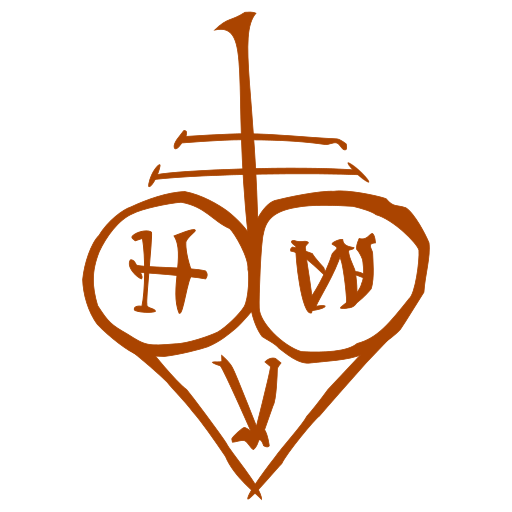
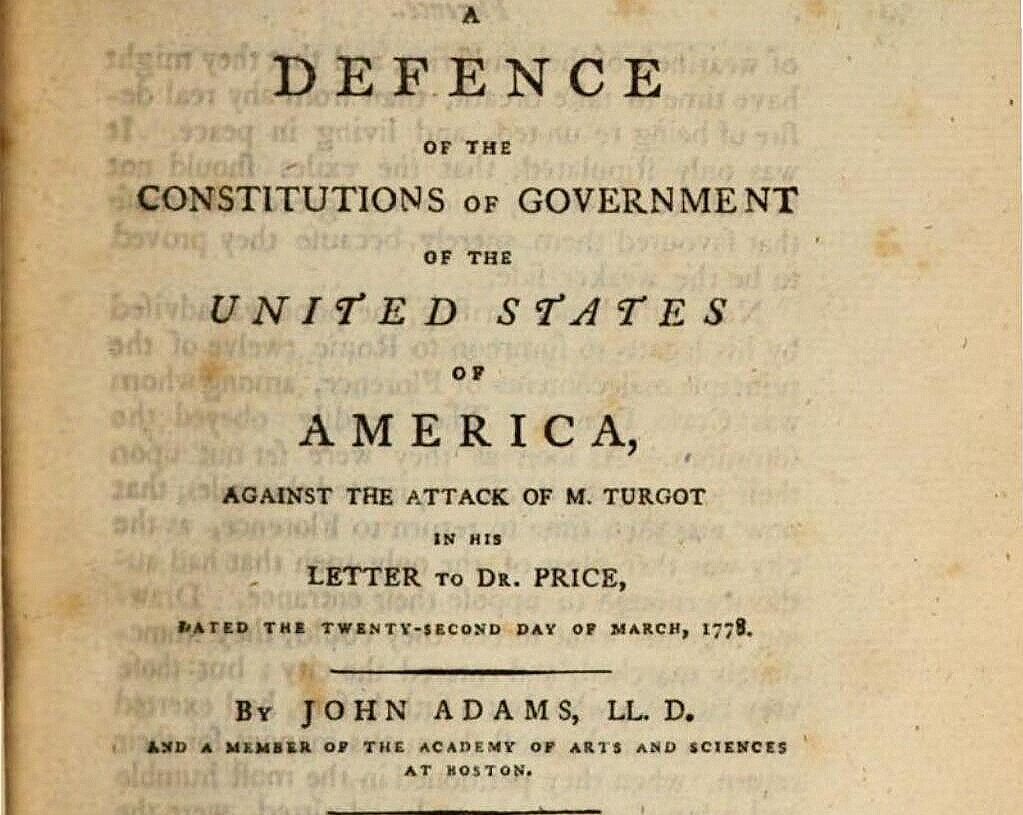
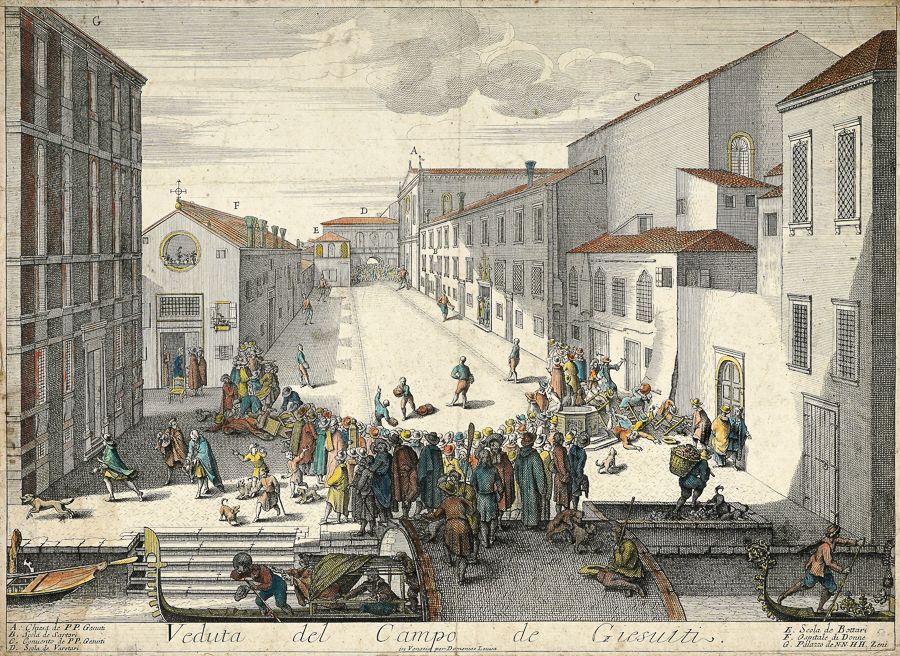
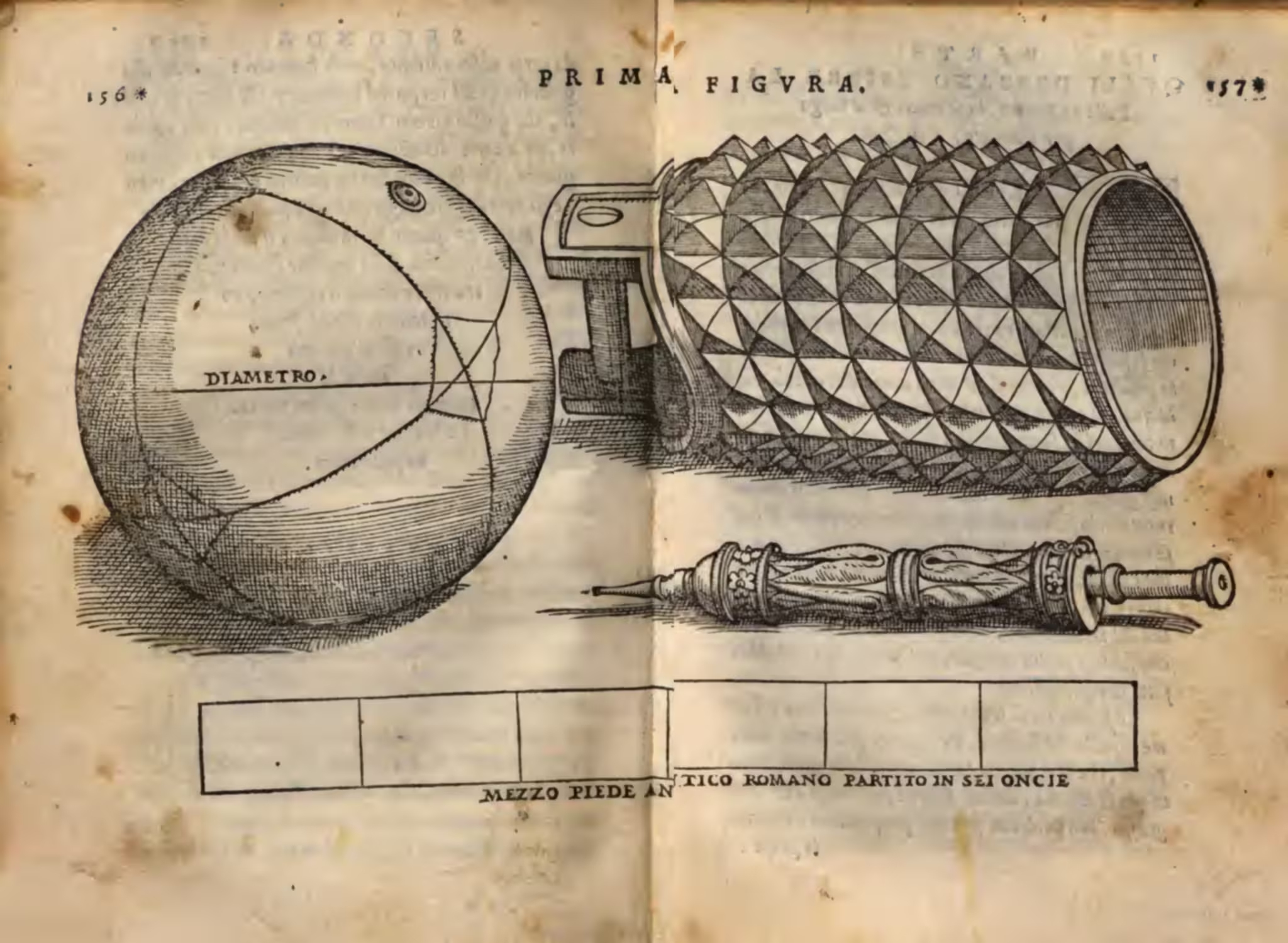
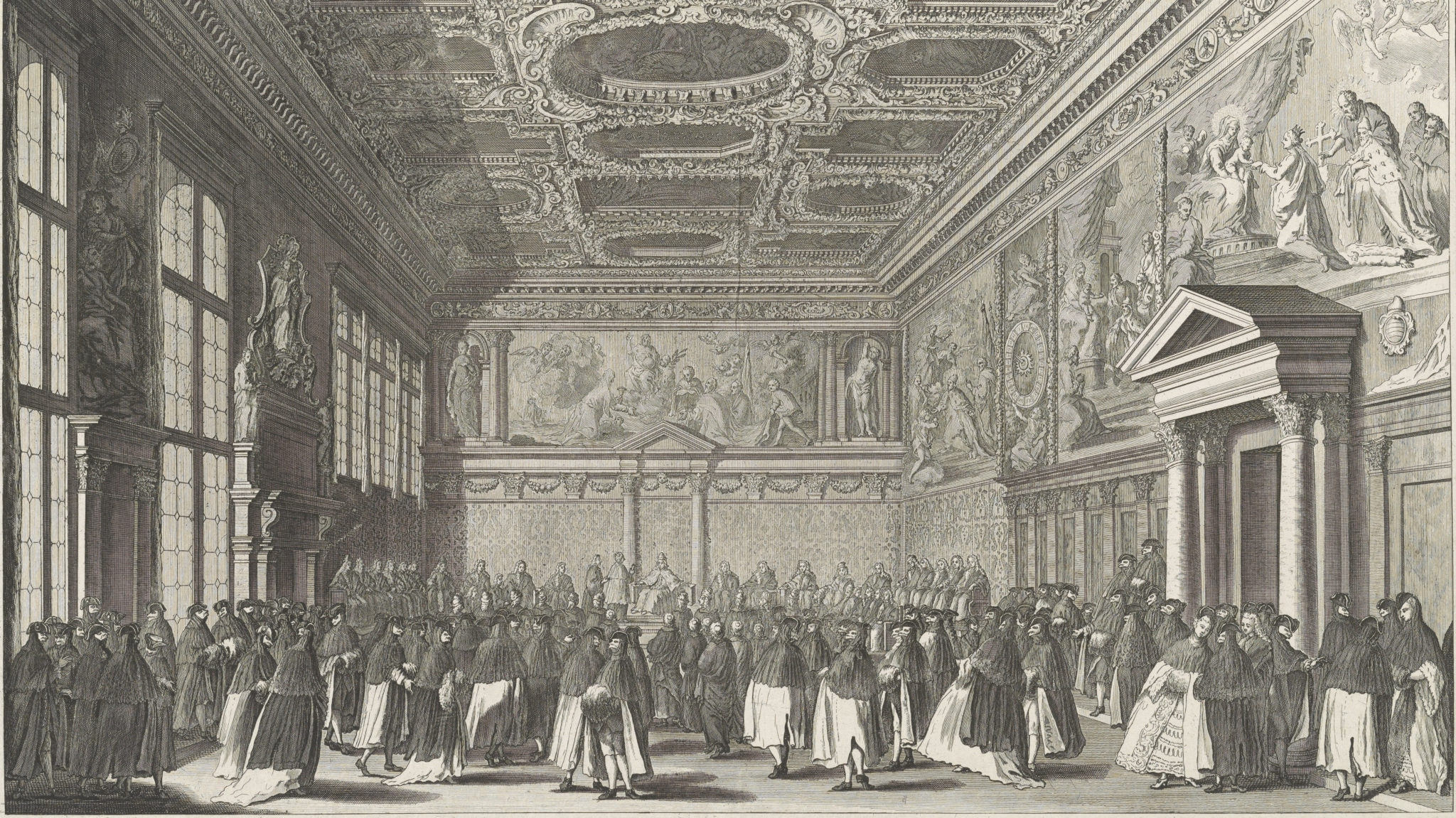
Leave a Reply